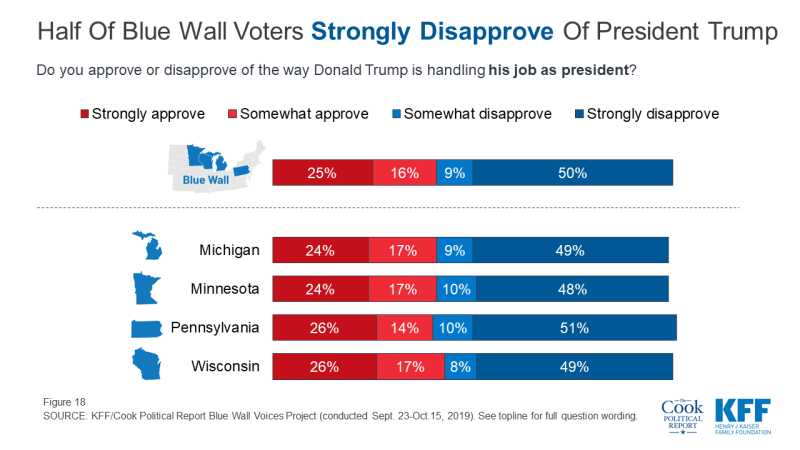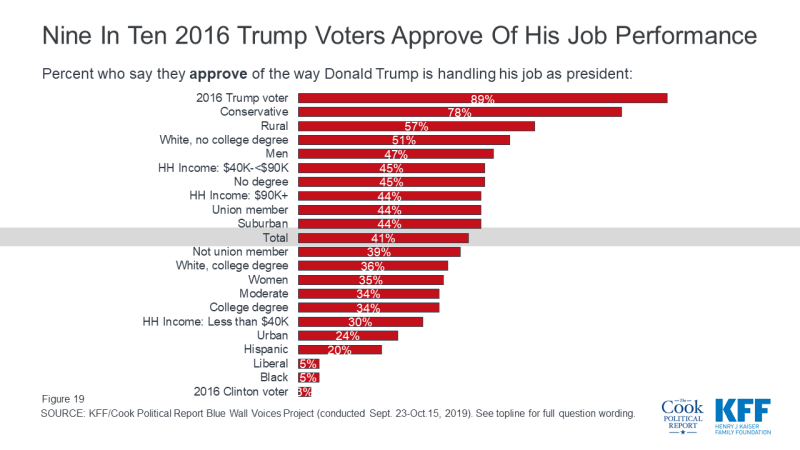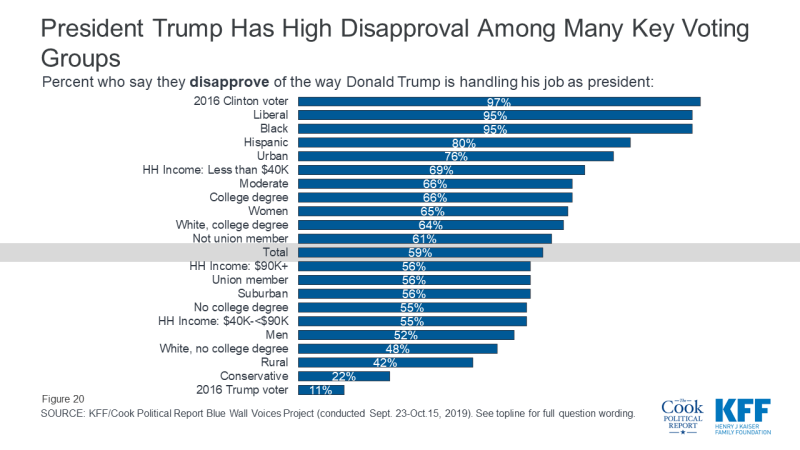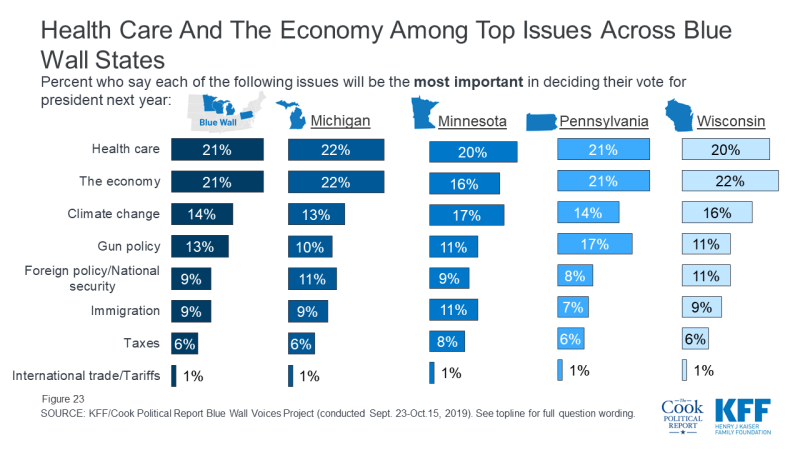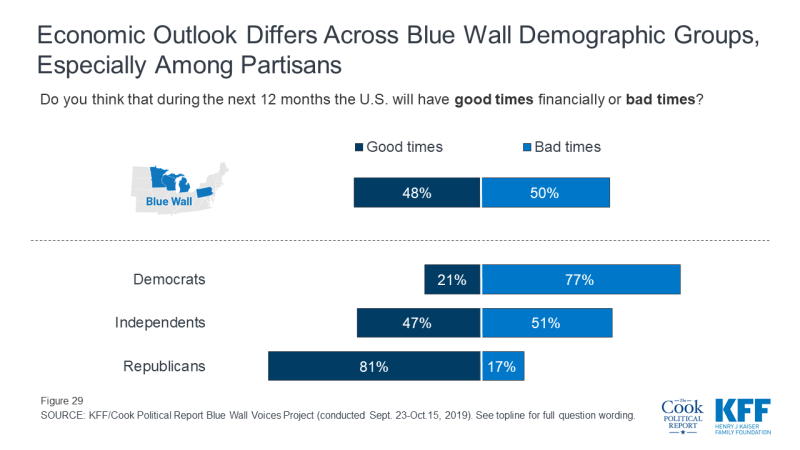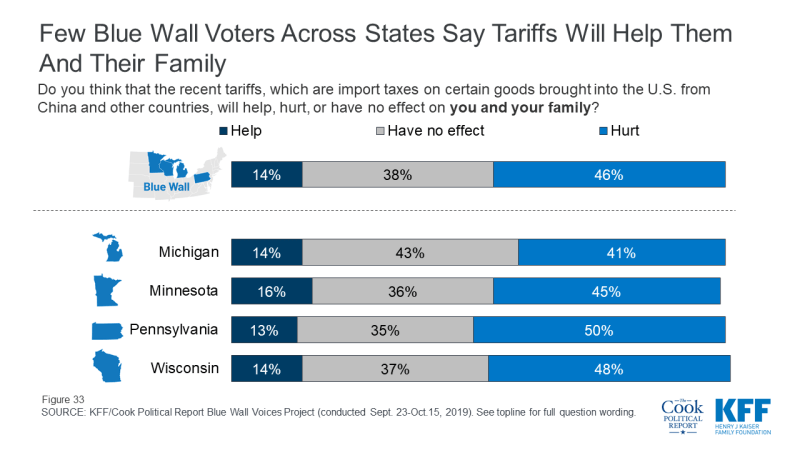Blue Wall Voices Project
How National Issues May Influence 2020
Health care and the economy are the top issues for voters in these states leading up to the 2020 presidential election but they are also two issues on which voters give President Trump very different marks. Voters give President Trump a somewhat positive rating (-1 percentage points) on the way he is handling the economy while a larger share of voters disapprove than approve of the way President Trump is handling health care (-21 percentage points net approval). Health care is one of the only issues in which President Trump’s approval is lower than his overall job approval (-18 percentage points). This report also examines the role of other key issues in the 2020 election such as immigration and international trade.
President Trump Job Approval
President Trump’s approval in each of the states as well as the Blue Wall overall is similar to what we see in national polls with about four in ten voters (41%) in the Blue Wall saying they either “strongly approve” or “somewhat approve” of the way Donald Trump is handling his job as president, while six in ten (59%) disapprove. If we look at the strongest opinions, twice as many voters “strongly disapprove” of the job President Trump is doing than “strongly approve” (50% v. 25%). About half of voters in each of the four states strongly disapprove of the way Donald Trump is handling his job as president.
Support for President Trump runs highest among his base including voters who voted for him in 2016 (89%), conservative voters (78%), and rural voters (57%).
On the other hand, vast majorities of 2016 Clinton voters (97%) and liberal voters (95%) disapprove of his job performance. As do non-white voters across education groups, urban voters, voters earning less than $40,000 annually, moderate voters, and many more.
Voters in the Blue Wall states rank President Trump’s job performance most positively on the economy with about half of voters (49%) approving of the way Donald Trump is handling the economy. About four in ten voters approve of the job he is doing on the other issues including trade with other countries (43%), immigration (43%), foreign policy (40%), and health care (39%). There are no differences across the four states with similar shares of voters in Michigan, Minnesota, Pennsylvania, and Wisconsin approving of President Trump’s job on each of these key issues.

Figure 21: Blue Wall Voters Divided On President Trump’s Job On Economy, Majorities Disapprove Of His Job On Most Other Issues
There are, however, unsurprisingly strong partisan differences. Large majorities of Republican voters approve of the job President Trump is doing on all of the issues while independent voters lean more negative in their assessments of President Trump’s job performance. Few Democratic voters approve of his job performance on any of the national issues included in the survey. Across the issues, President Trump ranks best in his handling of the economy with 94% of Republicans approving of the way he is handling the nation’s economy, as do half of independent voters and 11% of Democratic voters.
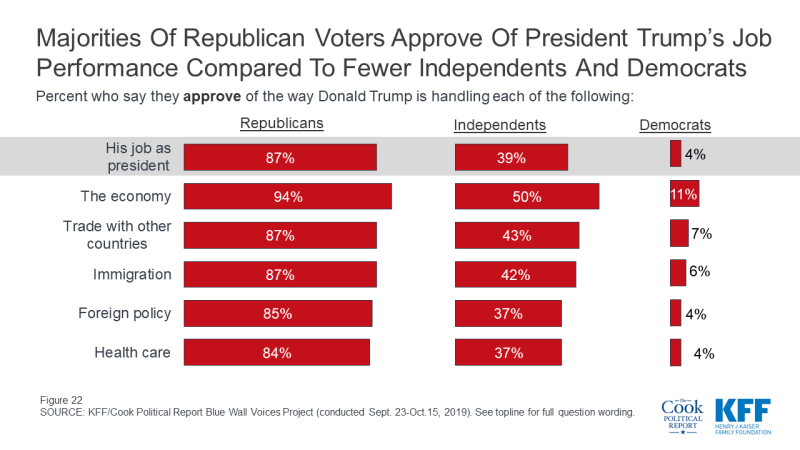
Figure 22: Majorities Of Republican Voters Approve Of President Trump’s Job Performance Compared To Fewer Independents And Democrats
Voters Say Health Care and Economy Are Top Issues
One year out from the 2020 general election, health care and the economy are the top two issues for voters. About one-fifth of voters say health care (21%) or the economy (21%) will be the most important issue in deciding their vote for president next year. These are followed by climate change (14%), gun policy (13%), foreign policy (9%), immigration (9%), taxes (6%), and international trade and tariffs (1%).
An Increased Interest in Foreign Policy?
The Blue Wall Voices Project was conducted September 23rd – October 15th, 2019. Two major foreign policy news stories happened during the field period including the U.S. House of Representatives’ impeachment inquiry and the Turkish invasion into Syria. While news regarding President Trump’s phone call with the Ukrainian President was released prior to the field period, House Speaker Nancy Pelosi announced a formal impeachment inquiry into Trump on September 24th. The news regarding his interactions with foreign leaders remained the top news for the weeks following as testimonies began before House committees. In addition, on October 12th President Trump’s administration announced that U.S. troops would be pulling back from northern Syria, subsequently allowing for Turkey forces to move into a region controlled by the Kurdish forces. Almost immediately, Turkey began assaults against Kurdish fighters and civilians in Syria. This lead to the U.S. to call on Turkey to stop the invasion and announce sanctions aimed at restraining the Turks’ assault. All of these events have led to an increase in the importance of foreign policy among voters in Michigan, Minnesota, Pennsylvania, and Wisconsin. Foreign policy and national security now rank alongside gun policy and immigration as the issues voters say will be the most important in deciding their vote for president next year.
Health care and the economy are the top issues across the Blue Wall states with Minnesota voters also selecting climate change as one of their top issues (17%). To see more about how partisans rank these issues in each state, check out the individual state reports.
The ranking of issues is largely driven by partisanship. Twice as many Republican voters say the economy will be the most important issue in deciding their vote for President next year than any other issue. Republicans rank the economy (30%), gun policy (15%), and immigration (15%) as the top issues in the presidential election. Democrats rank health care (27%) and climate change (25%) as the top issues. Independent voters choose health care (23%) and the economy (21%) as their top two issues.
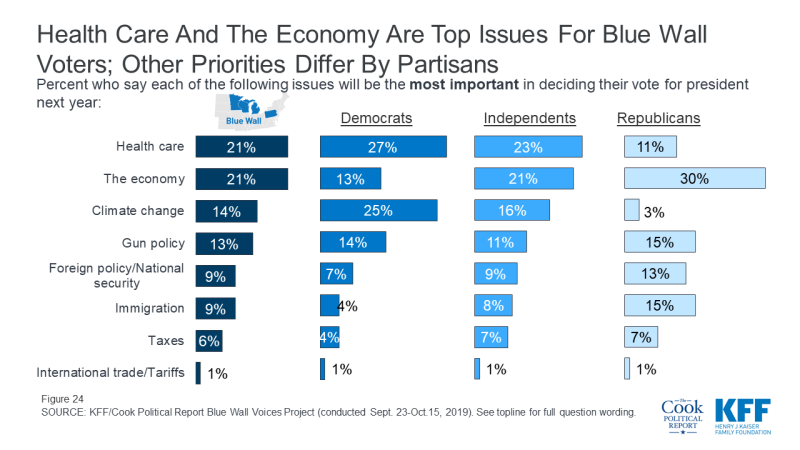
Figure 24: Health Care And The Economy Are Top Issues For Blue Wall Voters; Other Priorities Differ By Partisans
Voters who are still undecided about their 2020 vote choice or haven’t made up their minds yet, our swing voters, rank the issues very similarly with health care and the economy as the top issues they say will be the most important in deciding their vote for president next year. In addition, health care and the economy are the top issues among swing voters in Michigan (23% and 25%), Minnesota (19% and 20%), Pennsylvania (19% and 24%), and Wisconsin (21% and 23%).
Health Care
Lowering prescription drug costs and making sure the ACA’s protections for people with pre-existing health conditions continue are the top health care priorities that voters want to see Congress take on next year. About two-thirds of voters (across states) say lowering prescription drug costs for as many Americans as possible should be a top priority for Congress which is similar to the share who say making sure the ACA’s protections for people with pre-existing conditions should be a top priority. These are the top health care priorities across voters in Michigan, Minnesota, Pennsylvania, and Wisconsin.
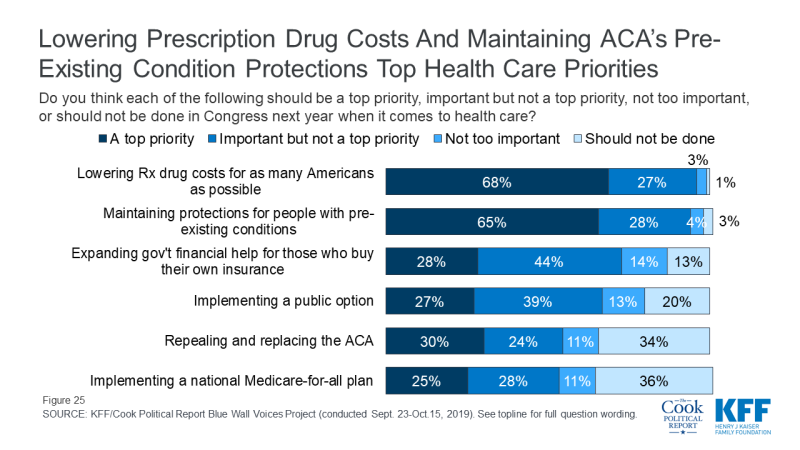
Figure 25: Lowering Prescription Drug Costs And Maintaining ACA’s Pre-Existing Condition Protections Top Health Care Priorities
Lowering prescription drug costs ranks at the top of the list of health care priorities among all partisans (74% of Democratic voters, 69% of independent voters, and 62% of Republican voters). Making sure the ACA’s protections for people with pre-existing conditions continue is a top priority for both Democrats (83%) and independent voters (65%) while more than half of Republican voters (54%) say repealing and replacing the ACA is a top priority for Congress.
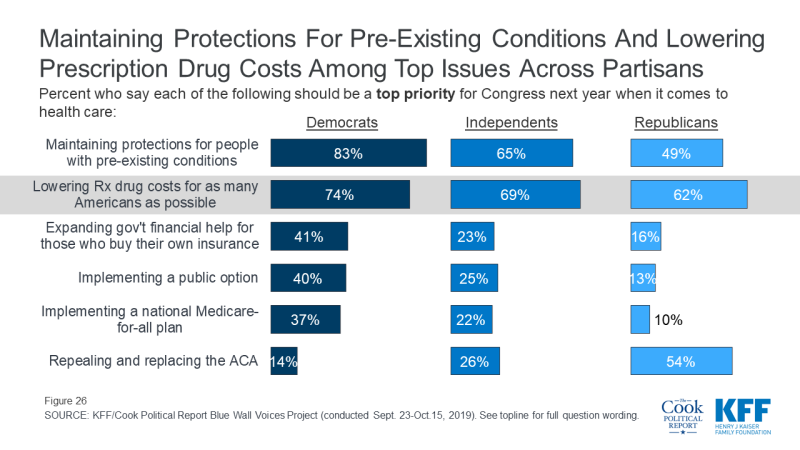
Figure 26: Maintaining Protections For Pre-Existing Conditions And Lowering Prescription Drug Costs Among Top Issues Across Partisans
Immigration
Overall, majorities of voters in each of the four states have positive views of immigrants in this country. Most say it is generally true that “immigrants strengthen our country because of their hard work and talents” (72%) and that it is generally not true that “immigrants are a burden on our country because they take their jobs” (81%) or “increase rates of violent crimes in this country” (75%).
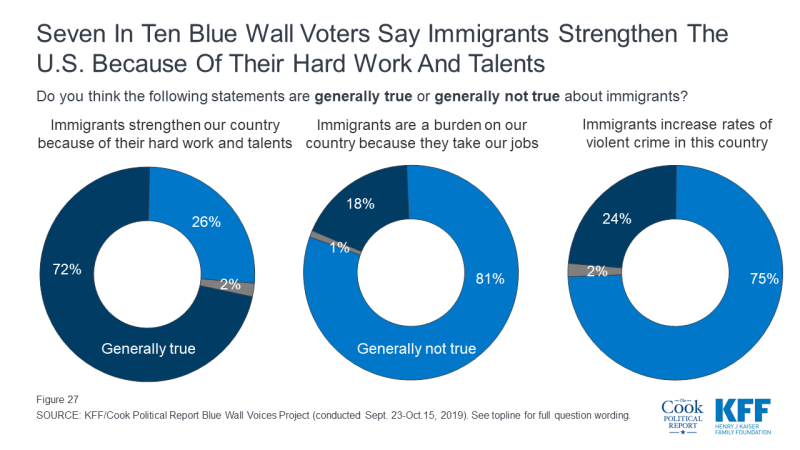
Figure 27: Seven In Ten Blue Wall Voters Say Immigrants Strengthen The U.S. Because Of Their Hard Work And Talents
While most Republican voters in Michigan, Minnesota, Pennsylvania, and Wisconsin say that it is generally not true that “immigrants are a burden because they take our jobs,” they are more divided on whether they think “immigrants increase rates of violent crime in this country.” Half of Republican voters say this is generally not true which is similar to the share who say it is generally true (47%).
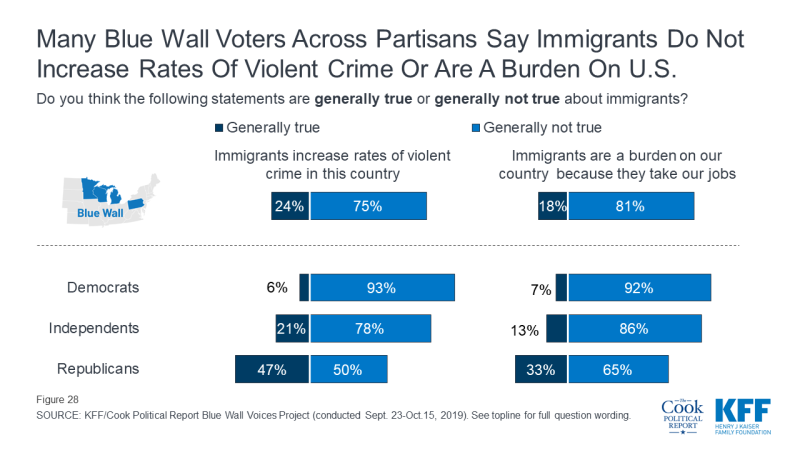
Figure 28: Many Blue Wall Voters Across Partisans Say Immigrants Do Not Increase Rates Of Violent Crime Or Are A Burden On U.S.
The U.S. Economy
While the economies of each of the states included in the Blue Wall Voices Project are distinct, the views of the economic outlook for the next year as well as views towards the fairness of the economic system are largely similar. The major differences in voters’ perceptions of the U.S. economy are mostly driven by party identification.
Voters are divided along party lines in their economic outlook for the next year with three-fourths (77%) of Democratic voters (across states) saying they expect that during the next 12 months the U.S. will have “bad times” while eight in ten Republicans (81%) say they expect the U.S. will have “good times.” Independent voters are split with similar shares saying they expect that during the next 12 months the U.S. will have good times financially (47%) as bad times (51%).
Views of the fairness current economic system are also largely partisan with larger shares of Democratic voters saying it is more often that “needy people go without government help in American today” (68%) than say it is more often that “irresponsible people get government help they don’t deserve” (30%). Republican voters view the system differently with the vast majority saying it is more often that “irresponsible people get government help they don’t deserve” (84%). A larger share of independent voters also say “irresponsible people getting government help they don’t deserve” happens more often in America today (55%).
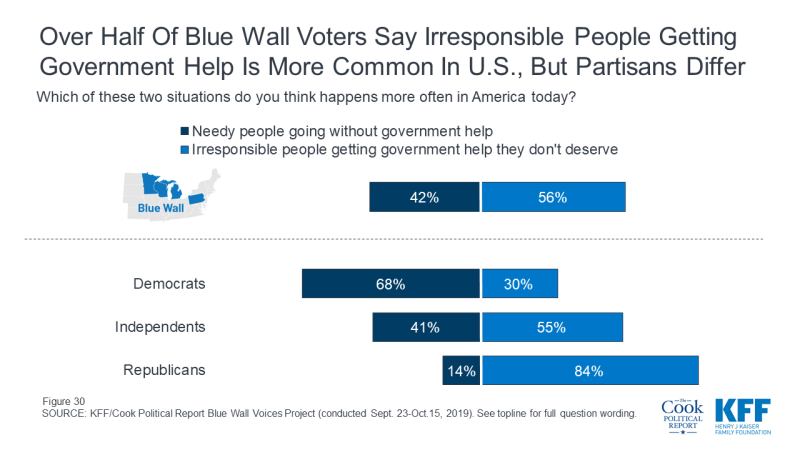
Figure 30: Over Half Of Blue Wall Voters Say Irresponsible People Getting Government Help Is More Common In U.S., But Partisans Differ
Six in ten voters (62%) say that “unfairness in the economy that favors the wealthy” is a bigger problem in this country while one-third of voters (36%) say “over-regulation that interferes with growth and prosperity” is a bigger problem. Nine in ten Democratic voters (93%) say unfairness in the economy is a bigger problem while seven in ten Republican voters (72%) say over-regulation is a bigger problem. Six in ten (63%) independent voters say unfairness in the economy is a bigger problem while 36% say over-regulation is a bigger problem.
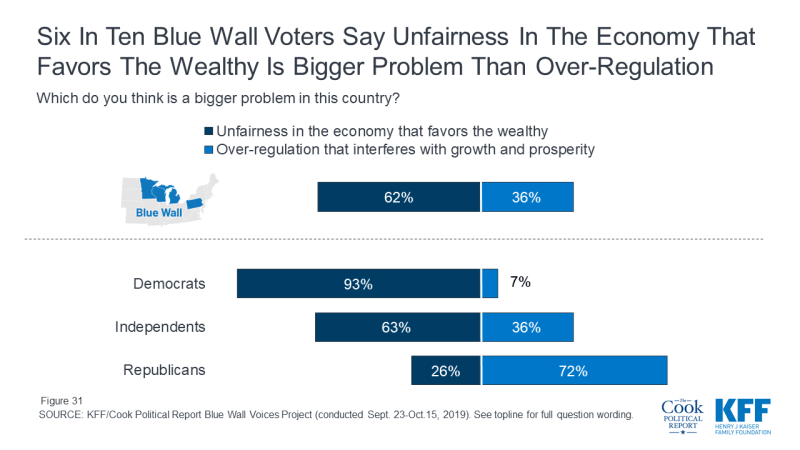
Figure 31: Six In Ten Blue Wall Voters Say Unfairness In The Economy That Favors The Wealthy Is Bigger Problem Than Over-Regulation
International Trade and Tariffs
With the U.S. engaged in a trade dispute with China and other countries, the Blue Wall Voices project sought to examine voters’ opinions of the possible impacts of the tariffs in Michigan, Minnesota, Pennsylvania, and Wisconsin.
More than half of voters in the Blue Wall say the recent import taxes on certain goods brought into the U.S. from China and other countries will hurt both the national economy (55%) and workers in their state (55%). While these views are largely partisan, about one-fourth of Republican voters say the recent tariffs will hurt both the national economy (23%) and workers in their state (25%).
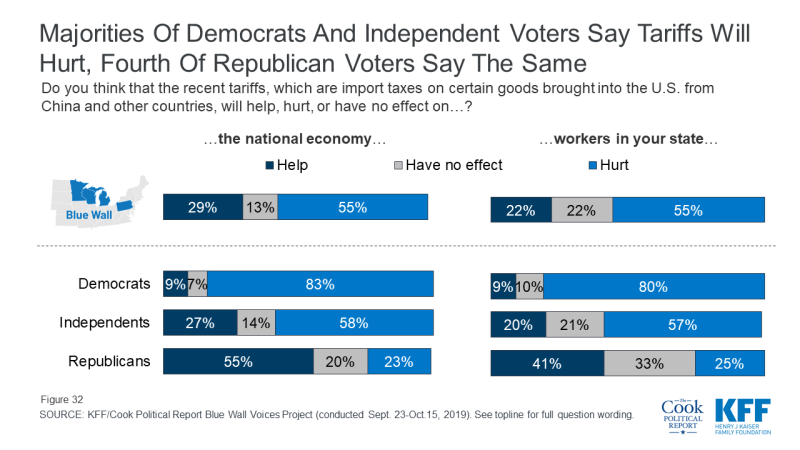
Figure 32: Majorities Of Democrats And Independent Voters Say Tariffs Will Hurt, Fourth Of Republican Voters Say The Same
Overall, a larger share of voters in the Blue Wall say the recent tariffs will hurt rather than help them and their families, but a considerable share also say they expect the import taxes to have no effect. More than four in ten voters say the recent tariffs will hurt them and their family including roughly half of voters in Pennsylvania and Wisconsin.
Partisanship plays a large role in views of recent tariffs with seven in ten Democrats (69%) saying the tariffs will hurt them and their families compared to 46% of independent voters and 21% of Republican voters.
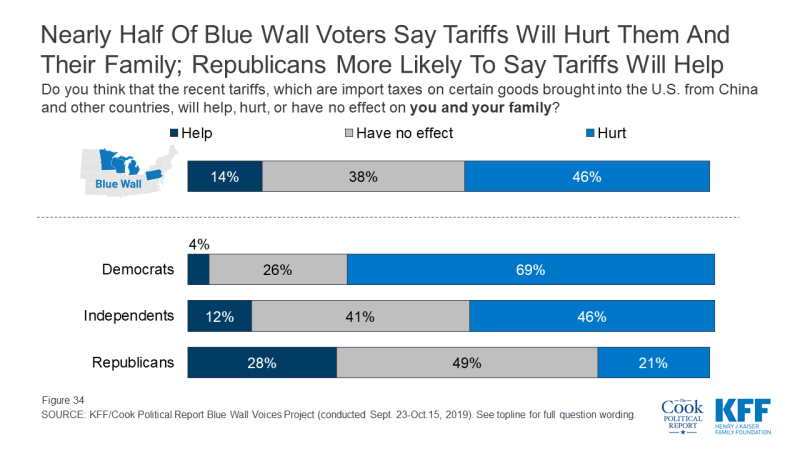
Figure 34: Nearly Half Of Blue Wall Voters Say Tariffs Will Hurt Them And Their Family; Republicans More Likely To Say Tariffs Will Help
President Trump Currently Has Support Among Rural Voters, But The Economy Matters A Lot To This Group And Many Worry About The Effect Of Recent Tariffs
One key group that President Trump needs to retain support from in 2020 are rural voters. The poll indicates that currently President Trump has the support of rural voters in Michigan, Minnesota, Pennsylvania, and Wisconsin with larger shares of rural voters in each of the states saying they are either “definitely” or “probably” going to vote for President Trump than the Democratic nominee.
| Table 3: President Trump Currently Has Support Among Rural Voters In Upper Midwest | |||||
| Total Rural Voters |
Michigan Rural Voters |
Minnesota Rural Voters |
Pennsylvania Rural Voters |
Wisconsin Rural Voters |
|
| Definitely voting for President Trump | 32% | 29% | 38% | 35% | 28% |
| Probably going to vote for President Trump | 12 | 13 | 10 | 11 | 13 |
| Undecided | 27 | 29 | 24 | 27 | 27 |
| Probably going to vote for Democratic nominee | 6 | 4 | 7 | 4 | 10 |
| Definitely voting for Democratic nominee | 18 | 18 | 20 | 15 | 20 |
A key issue for this group is the economy with large shares of rural voters in each of the states saying the economy is among the most important issues when deciding their vote next year. And most rural voters approve of the way President Trump is handling the economy with about two-thirds of rural voters in Michigan (66%), Minnesota (65%), Pennsylvania (66%), and Wisconsin (61%) saying they either “strongly approve” or “somewhat approve.” In addition, majorities of rural voters in each state say they expect the U.S. will have good times financially during the next 12 months.
Rural voters are currently less negative in their assessment of how the recent tariffs will hurt workers in their state, the national economy, or their family than suburban and urban voters. But still about half of rural voters say the recent tariffs will hurt workers in their state (47%) and the national economy (45%), while about four in ten (39%) say the recent tariffs will hurt them and their families.

